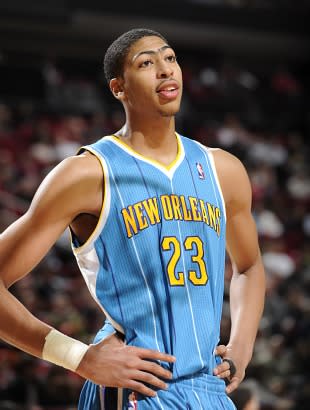Anthony Davis is justifying the hype, despite dwindling Rookie of the Year chances

Last June, most pundits agreed that the 2012 NBA draft featured a single likely star: freshman Kentucky power forward Anthony Davis. His defense was far enough along that it was logical to project multiple Defensive Player of the Year awards, and his offense was developing and not even particularly problematic to begin with. He seemed like the clear favorite to be this season's Rookie of the Year, and he was the only real choice for the New Orleans Hornets with the first overall pick.
Those plans haven't quite worked out. Davis has missed 13 games with injury — two due to a concussion, 11 due to a stress reaction in his ankle. On top of that, Portland Trail Blazers point guard (and No. 6 overall pick) Damian Lillard has been a bona fide sensation, willing his team to the eighth position in the West's standings through a mixture of scoring and setting up his teammates.
But that doesn't mean Davis has been a disappointment. In fact, as Rob Mahoney explains in a must-read column for The Point Forward, Davis is doing everything that made him such a compelling prospect last spring:
This is the beginning of something truly special, and the fact that Davis isn’t commanding the NBA world’s attention shouldn’t be mistaken for a lack of relevance. The most powerful force at work here is an innate inaccessibility in the game of a fundamentally weird player. Davis doesn’t mesh with conventional standards of basketball stardom, starting with the fact that he isn’t a go-to offensive option. You can’t feed Davis on the low block, as he struggles with his back to the basket even against undersized players. You can’t really set him up at the elbow, either, because he hasn’t quite worked out all the kinks in his face-up game. There is no spot on the floor that enables Davis to be a scorer in isolation, and thus no means to reinforce his standing as a franchise player in the most obvious and direct way possible.
For many, this notion of a potential superstar without a plainly viable offensive game creates some basketball dissonance. Davis’ promise as a defender may be universally accepted and lauded, but the players largely considered to be the league’s best are far more similar to Lillard than Davis: smooth with the ball, in charge in crunch time and utterly unstoppable on offense for particularly dominant stretches. Davis isn’t and may never be any of those things, and yet it hardly matters. Within his bizarre offensive game isn’t just the next step in the natural progression of the big man, but a glimpse at a transcendent specimen several links ahead in the evolutionary chain. Davis isn’t merely set to be an all-world defender; he brings a groundbreaking package of offensive skills and instincts at a time when basketball itself is most amenable to his avant garde game.
The league has come to a point where no offensive factor is more important than spacing, and no single trait is more crucial to a big man’s success than his ability to contribute to that spacing. That doesn’t necessarily mean that every big man on the floor has to stretch all the way out to the three-point line; even range-less big men can contribute by better understanding when and where to cut to the hoop, and it’s in that regard that Davis is well ahead of the curve. Tune in to any Hornets possession not directly involving Davis (No. 23 in the videos below) and you’re quite likely to find him lurking on the weakside baseline — the super highway of off-ball cutting.
There's much more, including video analysis of representative plays and a consideration of the larger structure of the Hornets. It's a great column not just because Rob explains what makes Davis special, but that he does so by placing him in the context of shifting expectations for big men.
As more scoring expectations gradually shift from the frontcourt to the backcourt, the roles of big men change. That doesn't just affect their PPG averages — it has a major influence on the kinds of lineups that coaches can implement. Versatility takes on a new importance, and Davis is the sort of new-era big man who can work equally as well in a small-ball lineup as in a more conventional system. Davis allows experimentation and a level of flexibility that is becoming increasingly necessary.
Again, we're not conditioned to conceive of someone's ability to fit a system as a star quality, but these things do matter to team success. Take, for instance, Shawn Marion, who acted as the fulcrum of the Seven Seconds or Less attack for the Phoenix Suns even as Steve Nash and Amar'e Stoudemire put up more immediately impressive numbers. Davis can be that same kind of player: a star who puts up very good numbers but generally matters more because of what he allows the team to do.
In the end, it's up to fans whether or not we want to identify this kind of player as a star. Even if they don't get their due, though, they can end up making a bigger difference to title contenders than leading scorers.

 Yahoo Sports
Yahoo Sports 

